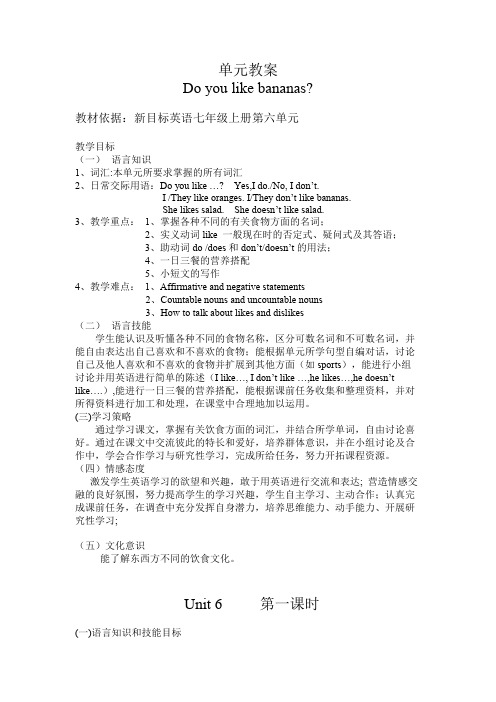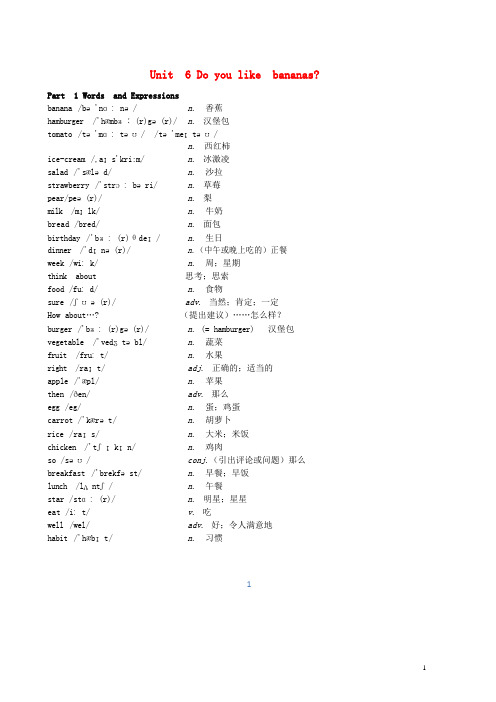2020七年级英语上册 Unit 6 Do you like bananas单元同步作文学案(无答案)
人教版七年级上册英语讲义 Unit 6 Do you like bananas

Unit 6 Do you like bananas? 讲义一、【重点单词】banana /bə'nɑ:nə/香蕉hamburger /'hæmbɜ:(r)ɡə(r)/汉堡包tomato /tə'mɑ:təʊ/西红柿ice-cream /,aɪs'kri:m/冰激凌salad /'sæləd/沙拉strawberry /'strɔ:berɪ/草莓pear /peə(r)/梨milk /mɪlk/牛奶bread /bred/面包birthday /'bɜ:(r)θdeɪ/生日dinner /'dɪnə(r)/(中午或晚上吃的)正餐week /wi:k/周;星期food /fu:d/食物sure /ʃʊə(r)/当然;肯定;一定burger /'bɜ:(r)ɡə(r)/汉堡包= hamburgervegetable /'veʤtəbəl/蔬菜fruit /fru:t/水果right /raɪt/正确的;适当的apple /'æpl/苹果then /ðen/那么egg /eɡ/蛋;鸡蛋carrot /'kærət/胡萝卜rice /raɪs/大米;米饭chicken /'ʧɪkɪn/ji鸡肉so /səʊ/ (引出评论或问题)那么breakfast /'brekfəst/早餐;早饭lunch /lʌnʧ/午餐star /stɑ:(r)/明星;星星eat /i:t/吃well /wel/好;令人满意的habit /'hæbɪt/习惯healthy /'helθi/健康的really /'ri:əli/真正地question /'kwesʧən/问题want /wɒnt/需要;想要be /bi:/变成fat /fæt/肥的;肥胖的二、【重点短语】1. John ’s birthday dinner 约翰的生日宴会2. vegetable salad 蔬菜沙拉3. two tomatoes 两个西红柿4. eat well 吃得营养5. think about 考虑6. eat/have breakfast/lunch/dinner 吃早/午/晚饭7. sports stars 体育明星8. the volleyball star 排球明星9. ask sb. about sth. 问某人某事10. like hamburgers/ice-cream 喜欢汉堡包/冰淇淋11. like eating eggs 喜欢吃鸡蛋12. her eating habits 她的饮食习惯13. be (not) healthy (不)健康14. one last question 最后一个问题15. healthy food 健康食物16. after breakfast/lunch/dinner 早/午/晚饭后17.one last question 最后一个问题18.some fruit 一些水果19.for dinner 作为晚餐20.how about 怎么样三、【重点句型】1.—Do you like salad? 你喜欢沙拉吗?一Yes,I do. /No, I don’t. 是的,我喜欢。
新目标七年级上册Unit6Do you like bananas?讲解与练习

新目标七年级上册Unit6Do you like bananas?讲解和练习讲解1、必背短语French fries炸薯条,ice cream冰淇淋,countable noun 可数名词,uncountable noun不可数名词,running star赛跑明星,healthy food健康食品,lots of=a lot of 大量;许多,a list of food食物清单,eat well吃得好2、词语辨析have和eathave 既可以指“吃”,也可以指“喝”。
I want to have some milk and some apple.我想喝些牛奶,吃些苹果。
eat 通常作“吃”。
I eat an apple every day.我每天吃一个苹果。
3、句型讲解1). —Do you like oranges? 你喜欢桔子吗?—Yes, I do. (P31) 是的,我喜欢。
like意为“喜欢”,“喜爱”。
like somebody or something 表示“喜欢某人或某事”。
如:I like him very much. 我非常喜欢他。
He doesn’t like salad. 他不喜欢沙拉。
2). —Let’s have French fries. 我们吃炸薯条吧。
—Oh, no. I don’t like. (P32) 哦,不,我不喜欢。
动词have意为“吃”,“喝”,是实义动词。
如:We have breakfast at seven. 我们七点钟吃早饭。
I don’t have coffee in the evening. 晚上我不喝咖啡。
注意:have 作此义解时,变成疑问句和否定句时必须用助动词do。
试译:你每天在家吃中饭吗?误:Have you lunch at home every day?正:Do you have lunch at home every day?3). Runner eats well! (P35) 赛跑选手吃得好!1)辨析:eat 或have:eat 与have 都可以表示“吃”的意思,有时两者可互换。
七年级英语上册人教版Unit6Do you like bananas?单元教案

单元教案Do you like bananas?教材依据:新目标英语七年级上册第六单元教学目标(一)语言知识1、词汇:本单元所要求掌握的所有词汇2、日常交际用语:Do you like …? Yes,I do./No, I don’t.I /They like oranges. I/They don’t like bananas.She likes salad. She doesn’t like salad.3、教学重点:1、掌握各种不同的有关食物方面的名词;2、实义动词like 一般现在时的否定式、疑问式及其答语;3、助动词do /does和don’t/doesn’t的用法;4、一日三餐的营养搭配5、小短文的写作4、教学难点:1、Affirmative and negative statements2、Countable nouns and uncountable nouns3、How to talk about likes and dislikes(二)语言技能学生能认识及听懂各种不同的食物名称,区分可数名词和不可数名词,并能自由表达出自己喜欢和不喜欢的食物;能根据单元所学句型自编对话,讨论自己及他人喜欢和不喜欢的食物并扩展到其他方面(如sports),能进行小组讨论并用英语进行简单的陈述(I like…, I don’t like …,he likes…,he doesn’t like….),能进行一日三餐的营养搭配,能根据课前任务收集和整理资料,并对所得资料进行加工和处理,在课堂中合理地加以运用。
(三)学习策略通过学习课文,掌握有关饮食方面的词汇,并结合所学单词,自由讨论喜好。
通过在课文中交流彼此的特长和爱好,培养群体意识,并在小组讨论及合作中,学会合作学习与研究性学习,完成所给任务,努力开拓课程资源。
(四)情感态度激发学生英语学习的欲望和兴趣,敢于用英语进行交流和表达; 营造情感交融的良好氛围,努力提高学生的学习兴趣,学生自主学习、主动合作;认真完成课前任务,在调查中充分发挥自身潜力,培养思维能力、动手能力、开展研究性学习;(五)文化意识能了解东西方不同的饮食文化。
人教版七年级上册英语例题与讲解:Unit6DoyoulikebananasSectionA

初中英语学习材料madeofjingetiejiUnit 6 Do you like bananas?突破词汇 Section A sure adv . 当然;肯定;一定→P95 Section B breakfast n . 早餐;早饭 →P102 How about...?(提出建议)……怎么样?→P96 healthy adj . 健康的 →P103 Section B eat v . 吃→P101 want v .需要;想要 →P103 well adv . 好;令人满意地→P102 fat adj . 肥的;肥胖的 →P104 把握句型 1.Do you like oranges?你喜欢橙子吗?2.Sure.How about burgers ,vegetable salad ,and some fruit?好吧。
咱们吃汉堡、蔬菜沙拉和水果怎么样?3.I don't want to be fat.我可不想变胖。
熟悉 语法 1.实义动词的一般现在时。
2.名词。
学会 交际 学会在日常生活中谈论好恶。
写作 练笔 学写某人喜爱或厌恶某物的短文。
Section A2dJack :Hey ,John's birthday dinner is next week.[1]Let's think about the food. Tom :[2]Sure.How about burgers ,vegetable salad ,and some fruit? Bill :Sounds good.John likes hamburgers.Jack :Oh ,I don't like salad.Bill :But John likes salad ,and it's his birthday.Jack :Yes ,you're right.What about the fruit?Tom :I think John likes strawberries and apples.Bill :OK.[3]Let's have strawberries and apples then.2d杰克:嗨,约翰的生日聚餐就在下周。
人教版2020年七年级英语上册Unit6Doyoulikebananas讲义(新版)人教新目标版

Unit 6 Do you like bananas?Part 1 Words and Expressionsbanana /bə'nɑːnə/ n. 香蕉hamburger /'hæmbɜː(r)gə(r)/ n. 汉堡包tomato /tə'mɑːtəʊ/ /tə'meɪtəʊ/n. 西红柿ice-cream /,aɪs'kri:m/ n. 冰激凌salad /'sæləd/ n. 沙拉strawberry /'strɔːbəri/ n. 草莓pear/peə(r)/ n. 梨milk /mɪlk/ n. 牛奶bread /bred/ n. 面包birthday /'bɜː(r)θdeɪ/ n. 生日dinner /'dɪnə(r)/ n.(中午或晚上吃的)正餐week /wiːk/ n. 周;星期think about 思考;思索food /fuːd/ n. 食物sure /ʃʊə(r)/ adv. 当然;肯定;一定How about…?(提出建议)……怎么样?burger /'bɜː(r)gə(r)/ n. (= hamburger) 汉堡包vegetable /'vedʒtəbl/ n. 蔬菜fruit /fruːt/ n. 水果right /raɪt/ adj. 正确的;适当的apple /'æpl/n. 苹果then /ðen/adv. 那么egg /eg/ n. 蛋;鸡蛋carrot /'kærət/ n. 胡萝卜rice /raɪs/ n. 大米;米饭chicken /'tʃɪkɪn/ n. 鸡肉so /səʊ/ conj.(引出评论或问题)那么breakfast /'brekfəst/ n. 早餐;早饭lunch /lʌntʃ/ n. 午餐star /stɑː(r)/ n. 明星;星星eat /iːt/ v. 吃well /wel/ adv. 好;令人满意地habit /'hæbɪt/ n. 习惯1healthy /'helθi/adj. 健康的really /'riːəli/ adv. 真正地question /'kwestʃən/ n. 问题want /wɒnt/ v. 需要;想要be /biː/ v. 变成fat /fæt/adj. 肥的;肥胖的Part 2:Texts课文(一)Jack: Hey, John’s birthday dinner is next week. Let’s think about the food.Tom: Sure. How about burgers, vegetable salad, and some fruit? Bill: Sounds good. John likes hamburgers.Jack: Oh, I don’t like salad.Bill: But John likes salad, and it’s his birthday.Jack: Yes, you’re right. What about the fruit?Tom: I think John likes strawberries and apples.Jack: OK. Let’s have strawberries and applesthen.Structure——谈论好恶1.Do you like salad? Yes, I do./No, I don’t.2.Do they like pears? Yes, they do./ No, they don’t.3.Does she like tomatoes? Yes, she does./ No, she doesn’t.4.I like oranges. I don’t like bananas.5.We like rice. We don’t like hamburgers.6.He likes ice-cream. He doesn’t like vegetables.重点句型:—Do / Does sb. like…?—Yes, sb. do / does.—No, sb. don’t / doesn’t.sb. like/likes ….sb. don’t/doesn’t like ….Underline the correct words in the brackets.在括号内正确的单词下画线。
初一英语上册Unit_6_Do_you_like_bananas

carrot
tomatoes
onion
broccoli
strawberries grapes
potatoes
1c
Listen and circle the food you hear in 1a.
1. orange 2. salad 3. eggs 4. apple
5. ice-cream 6. hamburger 7. banana
Countable nouns Uncount- Countable and
able nouns uncountable nouns
oranges carrots milk bananas tomatoes bread hamburgers eggs rice
vegetables apples
food fruit ice-cream salad chicken
5 以 o结尾的名词特殊记忆 Negroes and heroes like tomatoes and potatoes.
6 不规则变化 man - men ,foot - feet , woman - women child - childen
7 不可数名词如:broccoli
8既可数又不可数名词如:ice cream,salad
2.教学难点:如何引导学生询问或陈述对食物的喜 好。
五、教学策略
围绕以学生为中心的总策略综合运用任务型 教学法、情景交际教学法,合作探究、信息沟通 等方法使教学符合语言规律,努力达到课标的要 求。
六、教学媒体
本课采用现代化教学手段多媒体课件, 激发学生学习英语的兴趣。
Apple round, apple red. Apple juicy, apple sweet. Apple, apple, I love you. Apple sweet, I love to eat.
人教版英语七年级上册 Unit 6 Do you like bananas

This is a fruit and vegetable house (果疏屋). What’s in the house? (果蔬屋里有什么?)
some vegetables
some fruits
banana bananas
pear pears
strawberry strawberries
2 A: Do you like salad? B: No, I don’t.
1 A: Do you like bananas? B: Yes, I do.
3 A: Do you like oranges? B: Yes, I do.
Post-listening
1c Practice the conversations with your partner. Then make your own conversations.
2. tomatoes __i _ 3. oranges _f__ 4. ice-cream _h__ 5. salad __b_ 6. bananas _g__
7. strawberries __c_ 8. pears __j_
9. milk __e_ 10. bread _a__
Read the dialogue in the picture.
Read the conversation after the tape.
1. Girl: I like hamburgers. Do you like hamburgers? Boy: Yes, I do.
2. Girl: Do you like tomatoes? Boy: No, I don't like tomatoes.
—Do you like bananas? —Yes, I do. —Do you like salad? —No, I don’t. —Do you like oranges? —Yes, I do.
七年级英语Unit 6 Do you like bananas知识精讲

七年级英语Unit 6 Do you like bananas?【本讲主要内容】Unit 6 Do you like bananas?通过本课的学习我们应该能做下面的事:1. Learn to talk about likes and dislikes. 学习谈论好恶。
2. Learn the names of foods.学习一些食品的名称。
3. Talk about meals. 谈论三餐。
【知识掌握】【文化背景】1. 美国人的饮食习惯通常美国式饮食不讲究精细,追求快捷方便,也不奢华,比较大众化。
一日三餐都比较随便。
早餐以面包、牛奶、鸡蛋、果汁、麦片、咖啡、香肠等为主。
午餐一般在工作地点用快餐(快餐是典型的美国饮食文化,十分普及),一般有三明治、水果、咖啡、汉堡包、热狗等。
晚餐是正餐,比较丰盛,有一二道菜,如牛排、猪排、烤肉、炸鸡等,配面包、黄油、青菜、水果、点心等。
也有不少人上餐馆用晚餐。
美国餐馆很多,一般供应自助餐、快餐、特餐(固定份饭)、全餐等各种形式的餐饮,价格一般比较低廉,也可点菜,点菜价格最高。
早餐一般在8时左右,午餐一般在12时-14时,晚餐一般在18时左右。
他们在临睡前有吃点心的习惯,成人以水果、糖果为主,孩子则食用牛奶和小甜饼。
2. 做客进餐在有些文化中,作为客人去接受首次提供的食物是不礼貌的。
介于这个原因,到美国来访的客人有时会在主人首次邀请进食时说“不”。
他们期待主人再次邀请。
然而,在美国,主人会认为客人真不想吃了。
因此,当你在美国人家做客时,一定记住要如实地说出想要或不想要。
当然当你被邀到某人家去共进餐时,你不喜欢所提供的一些食品时,你可以不去吃它。
然而,你不要让人觉得你很讨厌那些食物。
如果可能的话,对每样食品都多少吃一点儿。
当然,挑你喜欢的吃两样,把其他的留在盘中也可以。
【词汇用法】1. lots of = (a lot of)许多;大量;很多既可以修饰可数名词,又可以修饰不可数名词。
- 1、下载文档前请自行甄别文档内容的完整性,平台不提供额外的编辑、内容补充、找答案等附加服务。
- 2、"仅部分预览"的文档,不可在线预览部分如存在完整性等问题,可反馈申请退款(可完整预览的文档不适用该条件!)。
- 3、如文档侵犯您的权益,请联系客服反馈,我们会尽快为您处理(人工客服工作时间:9:00-18:30)。
Unit 6 Do you like bananas?
话题:Healthy diet
School Class Name Date
一、本节课的学习目标
1.能力目标
(1)学会用英语表达喜欢与不喜欢的食品并会询问别人是否喜欢某种食物。
(2)掌握说明文的写作方法及技巧,展开以自己一日三餐的饮食习惯为主线,判断是否健康,并能完成“My Eat ing Habits”为题的写作任务。
2.情感目标: 教育学生要均衡饮食,合理健康。
二、语料箱
▲词块
单词: vegetables, breakfast, ice-cream...
短语: for dinner, eat ice-cream...
▲句型:
I like…and…
I don’t like…or…
I have…for breakfast
▲名言、谚语、警句 :
Eat healthy food and keep healthy! (吃健康食品, 保持健康!)
An apple a day, keep the doctor away! (一日一苹果, 医生远离我!)
Eat well in breakfast, eat enough in lunch and eat less in supper.
(早餐要吃好,午餐要吃饱,晚餐要吃少!)
三、写作任务
(一)Task 1 Watch and say
(二)Task 2 Pair work Talk about like or dislike
A: -Do they like…?
B:-Yes, they do. They like … .
No, they don’t. They don’t like … .
A:Do you like …?
B:Yes, I do. I like…
No, I don’t . I don’t like…
(三)Task 3 Group work
Make a survey采访你的朋友Do you like…?
Yes用√表示喜欢,No用×表示不喜欢填好表格并根据表格写一段话
(五)单元话题写作
假如你叫Jim,你喜欢吃健康食品,有一个良好的饮食习惯。
你从不吃垃圾食品。
请根据下面的表格提示写一篇短文,介绍一下你的饮食习惯并谈谈保持健康饮食的方法。
词数: 60个左右。
喜爱
人称:________________________ 时态:_________________________
体裁:_______________________, 按___________________的顺序叙述。
列提纲:
Beginning: __ ___ Main body:
___ Ending: ___ 写一稿(first draft):
写二稿(second draft):
(六)、评价
1 .自我欣赏与修正:朗读自己的文章,并从结构、人称、时态、字数、拼写、大小写、标点符号等方面进行自我修正。
2. 同伴互赏
(1) 写作基本要求:人称, 时态; (2) 要点齐全;
(3) 结构: 开头,正文,结尾; (4) 连词的运用;
(5)好词好句。
3. 评价标准
(七)总结反思
When we talk
about our
eating habits,
what writing
strategies
(写作策略)
can we use?。
